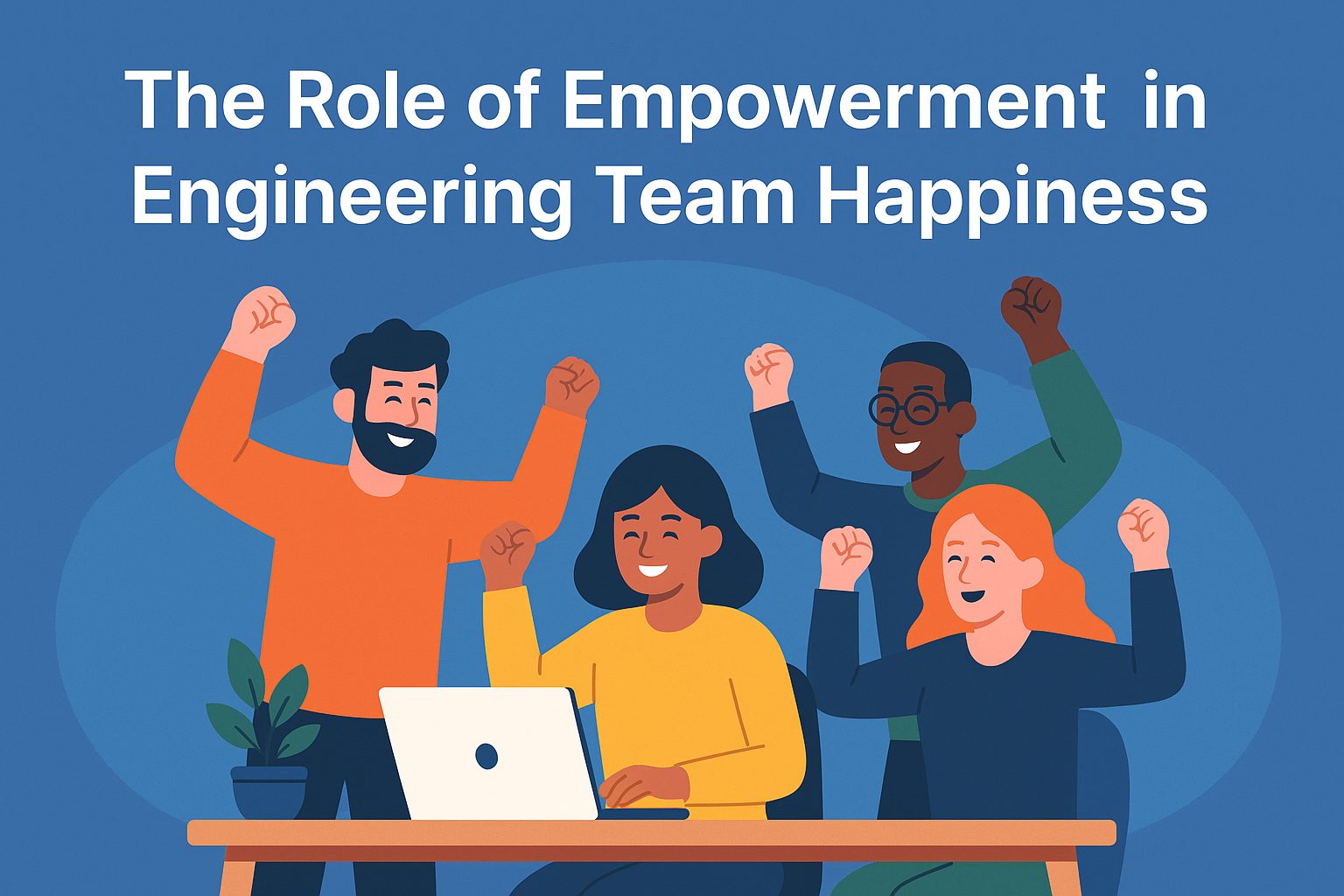The Role of Empowerment in Engineering Team Happiness

Engineering is, at its heart, a creative discipline. It’s about solving complex problems, building elegant solutions, and shaping the digital world in real time. But creativity withers in the face of micromanagement, rigid hierarchies, and a lack of trust.
That’s why empowerment is so crucial. It’s not a fluffy perk or a motivational poster - it’s the bedrock of engaged, happy, high-performing engineering teams.
When engineers feel empowered, they don’t just do their jobs - they own them. They bring energy, pride, and purpose to their work. They challenge assumptions, suggest better ways, and hold themselves to high standards - not because they’re told to, but because they want to.
Put simply: empowered engineers are happier engineers. And happy engineers build better products, stay longer, and contribute more meaningfully to the organisation’s success.
What Does Empowerment Really Mean?
Empowerment in engineering isn’t about giving people free rein or removing accountability. It’s about creating the conditions where autonomy, trust, and impact can thrive.
It means giving engineers:
Clarity: Clear goals, roles, and expectations so they understand what success looks like.
Autonomy: The space to choose how best to achieve those goals - selecting tools, shaping solutions, managing their time.
Support: Access to the resources, information, and leadership backing needed to move forward confidently.
Voice: The ability to influence decisions, challenge assumptions, and contribute ideas without fear.
True empowerment is about shifting from a top-down control mindset to one of enablement and trust.
Why Empowerment Fuels Happiness
Let’s break down how empowerment contributes directly to engineering team happiness:
1. Sense of Ownership
When engineers feel they have control over their work, their investment grows. Ownership drives intrinsic motivation - they care deeply because it’s theirs.
2. Increased Purpose
Empowered teams connect their daily work to broader outcomes. They understand the “why” behind what they’re building, which fuels a stronger sense of meaning.
3. Reduced Frustration
Rigid processes, excessive approvals, or constant second-guessing can sap morale. Autonomy gives engineers the freedom to move at pace and make decisions confidently.
4. Personal Growth
Making decisions, solving problems, and learning from failure accelerates professional development. Empowered environments are growth-rich environments.
5. Psychological Safety
When people are trusted, not scrutinised, they feel safe to ask questions, admit mistakes, and speak up. This safety is the foundation of well-being and team cohesion.
Signs Your Team Isn’t Empowered
Despite best intentions, many teams operate in low-empowerment environments. Warning signs include:
Engineers are often told what to build and how to build it - with little room to explore.
Decisions are escalated unnecessarily or delayed by red tape.
Feedback loops are slow, or input is routinely ignored.
Teams feel like feature factories, not problem-solvers.
Individuals are hesitant to take initiative or challenge the status quo.
If these symptoms sound familiar, it’s time to re-examine how empowerment shows up in your culture.
How Leaders Can Enable Empowerment
Empowerment isn’t passive. It’s an active leadership responsibility. Here’s how to do it well:
✅ Clarify the "What" and Trust the "How"
Set clear objectives, then step back. Let teams determine how to meet them. Resist the urge to solve or steer unnecessarily - ask questions, offer context, and coach instead of command.
✅ Push Decision-Making Closer to the Work
Avoid centralised gatekeeping. Enable teams to make local decisions on architecture, tooling, and trade-offs - with the right guardrails in place.
✅ Create Feedback Loops That Work Both Ways
Invite ideas, feedback, and critique from engineers. Act on what you hear. Show that their voice shapes the roadmap, the culture, and the way the team operates.
✅ Invest in Capability, Not Just Capacity
Don’t just ask more from engineers - give more to them. Training, mentorship, clear career paths, and access to learning are essential to help people rise to the trust you place in them.
✅ Celebrate Initiative and Learning
Empowerment is about encouraging experimentation, not just results. Celebrate when engineers take smart risks, challenge norms, or learn from failure.
Key Takeaways
✅ Empowerment is a happiness multiplier - it fuels autonomy, growth, and a deeper connection to meaningful work.
✅ It requires clarity, trust, and support - not the absence of structure, but the presence of purpose.
✅ Disempowered teams feel stuck and disengaged - watch for the signals and respond proactively.
✅ Leaders play a pivotal role - how you delegate, respond, and coach sets the tone for empowerment.
✅ When engineers feel empowered, they don’t just do more - they become more.
Final Thought
Engineering happiness doesn’t come from ping-pong tables or free snacks. It comes from doing great work, with great people, in a culture that trusts and enables you.
Empowerment is the bridge between potential and performance - between presence and purpose. If we want engineering teams to thrive, stay, and build brilliant things, we need to stop managing and start empowering.
Because the best teams don’t need to be pushed.
They just need the space to fly.
Engineering leader blending strategy, culture, and craft to build high-performing teams and future-ready platforms. I drive transformation through autonomy, continuous improvement, and data-driven excellence - creating environments where people thrive, innovation flourishes, and outcomes matter. Passionate about empowering others and reshaping engineering for impact at scale. Let’s build better, together.
